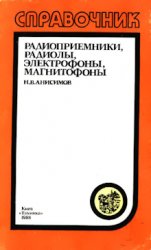- Добавил: literator
- Дата: 1-07-2025, 17:39
- Комментариев: 0
 Название: Arduino VIII: Portenta Machine Control
Название: Arduino VIII: Portenta Machine ControlАвтор: Steven F. Barrett
Издательство: Springer
Год: 2026
Страниц: 344
Язык: английский
Формат: pdf (true)
Размер: 26.6 MB
This book is about the Arduino microcontroller and the Arduino concept. This book, “Arduino VIII: Portenta Machine Control,” is an accessible primer on industrial control and programmable logic controller concepts for those without a deep instrumentation background. The Portenta Machine Control (PMC) is designed as an industrial control for equipment and machines. It couples a powerful dual processor microcontroller with industrial grade inputs and outputs. It also is equipped with a rich complement of onboard systems. An understanding of basic circuit theory is an appropriate prerequisite for the book. The three main goals for the book are: explore accessible Arduino Portenta Machine Control industrial control products; learn the fundamentals of programming using ladder logic; and explore related sensors and interface concepts. We use multiple examples throughout the book and conclude with an instrumented greenhouse project.








